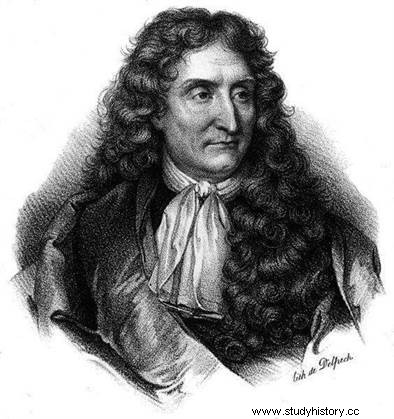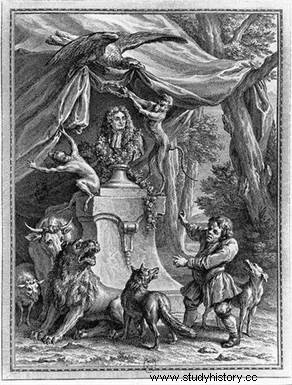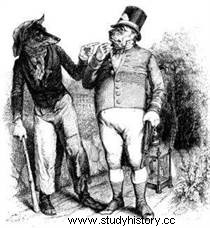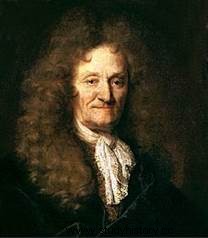 Short biography - Jean de La Fontaine (1621-1695) was a 17th century French writer. He wrote the very famous Fables, inherited from oral tradition and from the Greek fabulist Aesop. He shows a great mastery of the French language and verse. He was also the author of Tales, Poems, Comedies, Epistle and Speeches, which did not always earn him only admiration and friendships. Writer, slightly libertine poet, he will accede to the chair of the French Academy, his dearest ambition at the end of his life, but he will have to renounce his first tales and will thus be "in good standing" with God!
Short biography - Jean de La Fontaine (1621-1695) was a 17th century French writer. He wrote the very famous Fables, inherited from oral tradition and from the Greek fabulist Aesop. He shows a great mastery of the French language and verse. He was also the author of Tales, Poems, Comedies, Epistle and Speeches, which did not always earn him only admiration and friendships. Writer, slightly libertine poet, he will accede to the chair of the French Academy, his dearest ambition at the end of his life, but he will have to renounce his first tales and will thus be "in good standing" with God!
BIOGRAPHY OF JEAN DE LA FONTAINE (complete):
The beginnings of Jean de la Fontaine
Jean de la Fontaine was born on July 8, 1621 in Château Thierry, from a father master of Waters and Forests, Captains of the Hunts and a mother from Poitou. Beginning his education in his region by learning Latin, but not Greek - perhaps for lack of desire, he entered the Oratory of Paris at the age of twenty but left this school eighteen months later. . However, he appreciates the calm and tranquility of the place, spends his time reading, unfortunately these are not the readings advocated by his masters.  After an unfortunate marriage of convenience in 1647 with Marie Héricart during which a child was born in 1653, La Fontaine undertook studied law and in 1649 obtained a lawyer's degree from the Parliament of Paris. Inheriting the office of Master of Waters and Forests on the death of his father in 1652 (which he sold in 1672), and despite the heavy work, the future famous fabulist began to write. In Paris, he meets old friends like Maucroix, then new ones like Furetière, the Tallemant de Réaux brothers. He then attended "La table ronde", a literary friendship.
After an unfortunate marriage of convenience in 1647 with Marie Héricart during which a child was born in 1653, La Fontaine undertook studied law and in 1649 obtained a lawyer's degree from the Parliament of Paris. Inheriting the office of Master of Waters and Forests on the death of his father in 1652 (which he sold in 1672), and despite the heavy work, the future famous fabulist began to write. In Paris, he meets old friends like Maucroix, then new ones like Furetière, the Tallemant de Réaux brothers. He then attended "La table ronde", a literary friendship.
Attracted by the writings of Malherbe, Benserade and Voiture, he first practiced verse, epistles and ballads, then wrote L'Eunuch in 1654, a Clymène comedy in 1659 and a poem Adonis which earned him the protection of Nicolas Fouquet, Superintendent of Finances. To thank him, La Fontaine dedicated “Le Songe de Vaux”, “L’Ode au Roi” and “L’Elégie aux Nymphes de Vaux” to him. But…Fouquet is disgraced, La Fontaine remains faithful to him and Colbert marks his hatred for him, even leading to that of Louis XIV. Thus losing his protector, he was forgotten for a time in Limousin.
Tales and Fables of La Fontaine
Back in Paris in 1664, he became friends with Molière, Boileau and Racine. He took the opportunity to publish until 1674 his collections of Tales and Short Stories (with a libertine tendency) written for the Duchess of Bouillon, who had become his protector, drawing inspiration from Boccaccio and Ariosto, then his books of Fables from from 1668. Based on Aesop, Epicurus and Phaedrus, Jean de La Fontaine reworked these numerous Fables representing twelve thousand verses…
He establishes the popular and rustic genre by saying "I use animals to instruct men". After the Duchess of Bouillon, he moved to the Duchess of Orleans until 1673, then to Madame de la Sablière for twenty years. In 1678 he published a Second Book of Fables , which is added to the first in an illustrated edition in four volumes
 Borrowing the minor and popular form of the fable from an ancient tradition, La Fontaine makes it a refined yet natural piece . Thus "The frog who wants to be as big as the ox", a fable in mixed verse, taken from the first book of Fables, is traditional in certain aspects (characters of animals embodying human quirks, simple lexicon, dialogue form, distribution between exemplary story and explicit moral), but innovative, despite its brevity, by its narrative quality (liveliness, irony, work on rhythm). As for the moral, quite banal, it is worth especially by the humorous connection between the frog of the story and important characters of the society of the time.
Borrowing the minor and popular form of the fable from an ancient tradition, La Fontaine makes it a refined yet natural piece . Thus "The frog who wants to be as big as the ox", a fable in mixed verse, taken from the first book of Fables, is traditional in certain aspects (characters of animals embodying human quirks, simple lexicon, dialogue form, distribution between exemplary story and explicit moral), but innovative, despite its brevity, by its narrative quality (liveliness, irony, work on rhythm). As for the moral, quite banal, it is worth especially by the humorous connection between the frog of the story and important characters of the society of the time.
His chair at the Academy
Finally Jean de La Fontaine was elected to the Academy in 1684, in the chair of Colbert! Three years earlier, he had already applied, without result. When Colbert died in September 1683, two suitors were in the running:Boileau and La Fontaine. Arrived at the age of sixty-two years, it is the ambition of his life. But to take a chair, you have to praise the previous holder:what if “we have a grudge against a man”? The Academicians find better qualities in Jean de La Fontaine compared to Boileau, the first votes are in favor of La Fontaine, but King Louis XIV does not like him.
As a result, he does not agree to this election. The king had however decided:they would both enter the Academy at the same time, but how to get there? Fortunately for everyone, a new seat became vacant in April 1684. Boileau and La Fontaine entered the Academy. Colbert's praise was quick!
On this same occasion, he is obliged to deny in front of the assembly his licentious tales and works by acknowledging that he has gone a little too far. He takes this new function to heart, present at all the sessions…a good student. He finds in this environment Boileau, Perrault, Furetière and frequents salons and renowned writers like Mme de Sévigné, Mme de La Fayette. He also participated very actively in the Quarrels of the Ancients and the Moderns, fiercely defending the Ancients.
Jean de la Fontaine's end of life
 He was only seventy-one years old when illness struck him. With the death of the Duchesse de la Sablière in January 1693, he lost his most precious friend. His morale is at its lowest, he loses the taste for pleasures but above all the taste for life. He spent his time reading, immersed himself in the Gospels and began discussions with the priests. Father Pouget, by dint of persuasion, manages to make La Fontaine confess. He also insists on a public confession and a denial of his tales... which he does in his room in the presence of academicians. The abbot makes him promise to write only religious and pious texts. He can finally receive extreme unction.
He was only seventy-one years old when illness struck him. With the death of the Duchesse de la Sablière in January 1693, he lost his most precious friend. His morale is at its lowest, he loses the taste for pleasures but above all the taste for life. He spent his time reading, immersed himself in the Gospels and began discussions with the priests. Father Pouget, by dint of persuasion, manages to make La Fontaine confess. He also insists on a public confession and a denial of his tales... which he does in his room in the presence of academicians. The abbot makes him promise to write only religious and pious texts. He can finally receive extreme unction.
Getting better, he went again to the sessions of the Academy and in 1694 published Book XII of the Fables. But one evening in February 1695, he fell ill and died on April 13, 1695.
Bibliography
- Jean de La Fontaine, biography, by Roger Duchêne. Fayard, 1995.
- La Fontaine:Fables of Jean de La Fontaine. Pocket, 2002.
- Power and speech in Olivier Leplâtre's Fables de La Fontaine. Pul, 2002.
